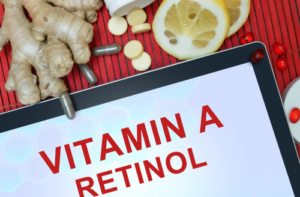Antiaging skincare is evolving.
From proven classics like peptides to rising stars like Retinol and CoQ10, today’s top ingredients reflect both science and market demand.
Let’s explore how these actives are shaping the next generation of beauty.
1. Retinol (Vitamin A Derivative)

Retinol is highly effective but can be irritating depending on skin type, so it should be used with care.
Its key benefits include:
1) Promotes skin cell regeneration
2) Improves the appearance of fine lines and pigmentation
3) Increases collagen production
Search volume for retinol began rising in 2023 and surged sharply in early 2024. Interest is particularly high in the EU, where searches for retinol far outpace those for other ingredients.
However, high-concentration products can cause significant irritation. Recently, encapsulation technology has been applied to improve stability and reduce irritation. In the skin, retinol is converted by naturally occurring enzymes into retinoic acid, which then acts on the DNA inside cells to trigger effective anti-aging changes. Retinol must first pass through an intermediate stage—retinal—before becoming retinoic acid. Some products now use retinal directly to shorten and maximize this process.
When first using retinol, start with a low concentration (0.1–0.3%) two to three times per week, then gradually increase frequency and strength.
Since retinol can make the skin more sensitive to UV exposure and the ingredient itself is unstable in sunlight, it is generally recommended for nighttime use.
2. Coenzyme Q10 (CoQ10)
While not as hyped as retinol, interest in CoQ10 has been steadily increasing. In Korea, CoQ10 skincare reached peak popularity in the mid-2000s. Even when I wasn’t particularly interested in anti-aging during my mid-20s, I was familiar with the ingredient thanks to frequent TV commercials.
This ingredient has powerful antioxidant properties that help reduce oxidative stress in the skin. It also supports processes such as keratinocyte turnover and skin barrier repair, boosting skin vitality.
As anti-aging has become a major beauty trend, CoQ10 is receiving renewed attention.
It is relatively stable and can be used both morning and night. However, to prevent oxidation, it should be stored in a light-protective container in a cool place.
3. Peptides
The final ingredient is peptides. Recognized as a core anti-aging ingredient for years, peptides have maintained popularity similar to retinol.
They stimulate the synthesis of collagen and elastin, improving skin firmness. This, in turn, helps reduce wrinkles and strengthen the skin barrier.
Peptides are popular as a gentler alternative or complement to retinol. In Europe, multi-peptide complexes—such as Liquid Peptides Advanced from Medik8—have been used in both raw materials and finished products.
They are well-tolerated even by sensitive skin and are often combined with retinol for enhanced synergy.
Anti-aging trends are evolving rapidly. WITH.C KOREA selects cutting-edge ingredients—such as retinol, CoQ10, and peptides—based on global market data to create optimal formulations.
From brand concept to ingredient selection and formulation development, we work with you to design and deliver products that stand out in the market.
Start developing products that combine trend and science with WITH.C KOREA today.
